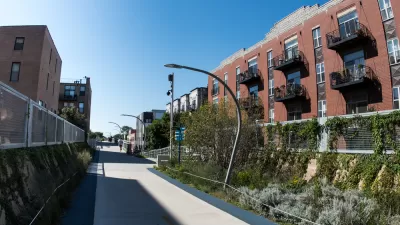Emily Badger discusses a phenomenon of gentrification in Chicago: former single room occupancy hotels, historically reserved for low-income housing, are being converted into market-rate rentals.
In the latest news in the affordability crisis of cities across the United States, Emily Badger of The Washington Post delves into a stark phenomenon in Chicago—the sale and redevelopment of single room occupancy (SRO) hotels into market-rate housing. Under this adaptive reuse business model, the SRO hotel is sold, remodeled to include a private bathroom and kitchens instead of communal facilities, and sold at market-rate prices for rooms ranging from 250-350 square feet.
Economically speaking, the purchase and redevelopment of these hotels into affordable housing is not feasible. According to Badger, "[the] cost of utilities, paid by owners, not tenants, has been rising. So have property taxes. These buildings are more expensive to operate than traditional apartments because they typically have on-site staff, and the greater tenant turnover causes more wear on units. They also often need costly repairs just to bring them up to code."
To address the flipping of SROs, the city of Chicago passed an ordinance earlier this week requiring SRO owners to "attempt six months of good-faith negotiations with a buyer on behalf of the tenants. If that falls through, though, owners then have a window of 120 days when they can try to find a buyer without any affordability restrictions. If they want to opt out of the whole process, the fees are now smaller but still substantial: Developers who wants to turn a 100-unit SRO into 100 market-rate studios would owe the city $2 million. And they’d owe each displaced tenant relocation fees between $2,000-$10,600."
Since 2011, 2,000 units of SRO hotels have been bought by developers and flipped, while only 6,000 SRO units remain today in Chicago.
FULL STORY: What happens when housing for the poor is remodeled as luxury studios

Maui's Vacation Rental Debate Turns Ugly
Verbal attacks, misinformation campaigns and fistfights plague a high-stakes debate to convert thousands of vacation rentals into long-term housing.

Planetizen Federal Action Tracker
A weekly monitor of how Trump’s orders and actions are impacting planners and planning in America.

In Urban Planning, AI Prompting Could be the New Design Thinking
Creativity has long been key to great urban design. What if we see AI as our new creative partner?

King County Supportive Housing Program Offers Hope for Unhoused Residents
The county is taking a ‘Housing First’ approach that prioritizes getting people into housing, then offering wraparound supportive services.

Researchers Use AI to Get Clearer Picture of US Housing
Analysts are using artificial intelligence to supercharge their research by allowing them to comb through data faster. Though these AI tools can be error prone, they save time and housing researchers are optimistic about the future.

Making Shared Micromobility More Inclusive
Cities and shared mobility system operators can do more to include people with disabilities in planning and operations, per a new report.
Urban Design for Planners 1: Software Tools
This six-course series explores essential urban design concepts using open source software and equips planners with the tools they need to participate fully in the urban design process.
Planning for Universal Design
Learn the tools for implementing Universal Design in planning regulations.
planning NEXT
Appalachian Highlands Housing Partners
Mpact (founded as Rail~Volution)
City of Camden Redevelopment Agency
City of Astoria
City of Portland
City of Laramie





























